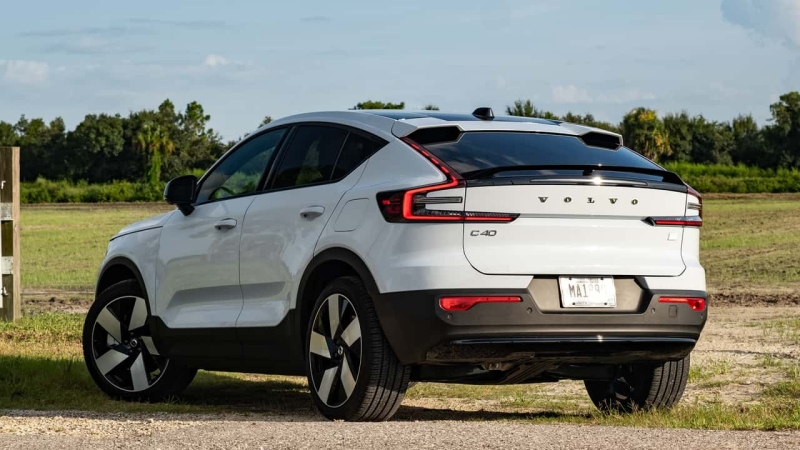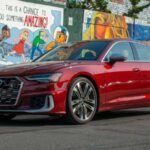The electric coupe-SUV feels like it was made for the most niche Volvo buyer.
Jeff Perez / Motor1
The Volvo C40 looks good. It’s nice to drive. It’s quiet, comfortable, and has just enough technology to keep people entertained. And at $59,995 as-tested for this single-motor, extended-range Ultimate model, it’s not that pricey given the current luxury EV market.
But for as nice as it all is, I can’t figure out who this car is for. The C40 is a Volvo SUV coupe—already a niche within a niche—sporting average range, an average charging rate, and less cargo space than its XC40 Recharge counterpart. It probably doesn’t have hoards of people banging down Volvo’s doors, and after a week behind the wheel, I’m not convinced even the nerdiest Volvo buyers will find much reason to take the C40 home.
| Quick Specs | 2024 Volvo C40 Recharge Single Motor Ultimate Extended Range |
| Battery | 78.0-Kilowatt-Hours |
| Output | 248 Horsepower / 310 Pound-Feet |
| 0-60 MPH | 6.9 Seconds |
| Weight | 4,453 Pounds |
| Base Price / As Tested | $56,090 / $59,995 |
If there’s anything that might convince buyers, it’s the way the C40 looks. In typical Volvo fashion, this SUV has clean lines, soft angles, and a few necessary—but not over-the-top—sporty cues. The slicked-back roof blends neatly into a trunk lid with a sporty spoiler on top. The taillights run up either side of the rear glass for a nice, cohesive shape. The front end, meanwhile, keeps most of the same elements that make the compact XC40 such a looker.
The interior follows suit: Sporty simplicity. You might be surprised to see cloth seats in a nearly $60,000 luxury vehicle, but they work here. The front and rear chairs have a great shape and feel, making them easy to sit in for hours on end. The rest of the cabin uses clean, simple lines and high-end materials—and a portrait-oriented 8.0-inch touchscreen graces the center of the dash.
Volvo uses the built-in Google system with maps, a voice assistant, Google Play Store access, and finally, Apple CarPlay. You still can’t use your phone-based Android Auto, which is annoying, but the C40 runs Google Maps and other functions pretty seamlessly. My only complaint is that the touch response doesn’t isn’t up to par with modern smartphones, and the Android Automotive system hasn’t changed much since its debut in 2019.
This single-motor, extended-range model has a 78.0-kilowatt-hour battery pack (usable capacity) sending power to a single, rear-mounted electric motor. With 248 horsepower and 310 pound-feet worth of instant torque, it takes this single-motor model a modest 6.9 seconds to reach 60 miles per hour, while the dual-motor version gets there in a brisk 4.5 seconds.
Most buyers will find the single-motor model quick enough. It has no issue pulling out in front of traffic and getting up to speed, or passing on the highway. Around town, the instant electrons make it feel zippy, and the aggressive one-pedal driving function means you can maneuver without even touching the brakes.
The C40 has decent moves in the corners, too. The updated 2024 model gains rear-wheel drive, which makes it more fun to flick around than some of the front-drive-based alternatives. The steering is quick, the suspension is responsive, and the single-motor model (while still a heavy vehicle at 4,453 pounds) feels lighter on its tires than some other EVs.
Ultimately though, the single-motor C40 leans into comfort, rather than sportiness. The cabin is coffin-quiet; No pesky gas-engine sounds infiltrating the interior. The only thing you might hear is some wind noise and tire roar at high speeds. According to my ears, the C40 is one of the quietest EVs out there.
But because of that sloped roof, the C40 isn’t as roomy as the XC40. It loses 2.4 inches of rear headroom and 8.5 cubic feet of cargo space compared to its traditional counterpart. It’s not totally uncomfortable, but with my six-foot frame, my head was nearly scraping the headliner.
The single-motor C40 has the better range of the two trims, driving up to 297 miles on a single charge according to the EPA. The dual-motor model gets just 257 miles of range by comparison. That puts the single-motor C40 smack dab in the middle of the pack; It has better range than the Genesis GV60 (294 miles) and Audi Q4 Sportback (265 miles), but falls short of the Ford Mustang Mach-E (320 miles) and Tesla Model Y (310 miles).
In terms of charging, the C40 sucks up electrons at a rate of 200 kilowatts on a DC fast charger. Volvo says that will get you from 10% to 80% in 28 minutes. The Mach-E will do the same in 32 minutes at 150 kilowatts and the Audi does 5% to 80% in 36 minutes at the same rate. The Kia EV6 and Genesis GV60 are the fastest chargers of the group, going from 10% to 80% in just 18 minutes at 240 kilowatts.
So who is the Volvo C40 for, exactly? I still haven’t figured it out. The Model Y goes further, the EV6 and GV60 charge faster, and for way less money, you can get a Mach-E with 320 miles of range. If you want something that looks exceptionally pretty, then Volvo’s got you covered. Otherwise, the C40 is a tough sell.
Jeff Perez / Motor1
Competitors
- Audi Q4 Sportback E-Tron
- Ford Mustang Mach-E
- Genesis GV60
- Kia EV6
- Tesla Model Y
Get the best news, reviews, columns, and more delivered straight to your inbox, daily. Sign up For more information, read our
Privacy Policy and Terms of Use.



